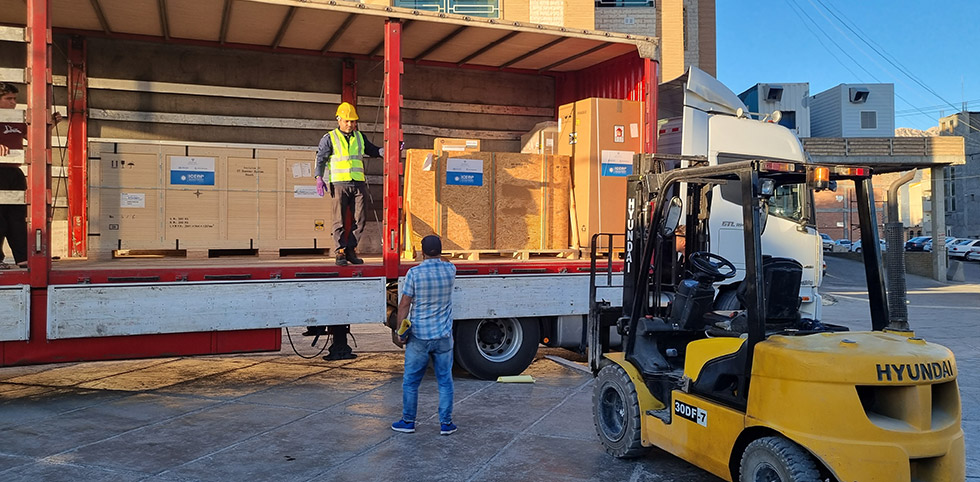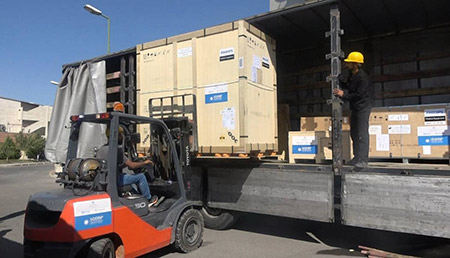
17 October 2023, Tehran, Islamic Republic of Iran – WHO has announced the successful delivery of 6 state-of-the-art computed tomography (CT) scanners to hospitals across the Islamic Republic of Iran, marking a significant milestone in a joint initiative aimed at bolstering critical health infrastructure within the country.
This delivery, undertaken as part of the Iran COVID-19 Emergency Response Project – Additional Financing (ICERP-AF), represents a collaborative effort between the Government of the Islamic Republic of Iran, the World Bank and WHO. The project, initiated in January 2022 following a request from the Iranian government to the World Bank for a €76.1 million loan agreement, is a dedicated endeavour to enhance access to life-saving medical equipment and services.
The 6 cutting-edge CT scanners have been strategically placed in public hospitals situated in the Hamedan, Ilam, Mazandaran, North Khorasan, Razavi Khorasan, and Yazd provinces. This allocation ensures that vital medical imaging capabilities are accessible to communities across these provinces.
 ICERP-AF , which has a planned duration of 21 months, is managed by a specialized team established within the WHO Country Office in the Islamic Republic of Iran. This team collaborates closely with the Economic Coordination Center of the Ministry of Health and Medical Education to coordinate the delivery of essential medical and laboratory equipment. A total of 71 medical devices – 42 magnetic resonance imaging (MRI) scanners, 15 CT scanners and 14 angiography machines – along with 814 laboratory devices, will be provided to 65 hospitals and 160 laboratories across 78 cities throughout the country. The distribution of these critical resources is based on the unique needs, capabilities, and level of health care services offered by each facility.
ICERP-AF , which has a planned duration of 21 months, is managed by a specialized team established within the WHO Country Office in the Islamic Republic of Iran. This team collaborates closely with the Economic Coordination Center of the Ministry of Health and Medical Education to coordinate the delivery of essential medical and laboratory equipment. A total of 71 medical devices – 42 magnetic resonance imaging (MRI) scanners, 15 CT scanners and 14 angiography machines – along with 814 laboratory devices, will be provided to 65 hospitals and 160 laboratories across 78 cities throughout the country. The distribution of these critical resources is based on the unique needs, capabilities, and level of health care services offered by each facility.
“The World Health Organization extends its gratitude to the Government of the Islamic Republic of Iran and the World Bank for their unwavering partnership in this vital endeavour. Together, we remain dedicated to advancing the health and well-being of the Iranian people and strengthening health care infrastructure nationwide,” said Dr Syed Jaffar Hussain, WHO Representative and Head of Mission to the Islamic Republic of Iran.
One of the standout features of ICERP-AF is the implementation of a grievance redress mechanism by WHO for all involved stakeholders. Designed to facilitate the resolution of complaints and grievances in a transparent, efficient, and fair manner, this mechanism aims to ensure that all parties involved are satisfied with the outcomes . This mechanism plays a crucial role in building trust, fostering cooperation, and enhancing community engagement within the broader context of health care service improvements.
In parallel, WHO, in collaboration with the Ministry of Health and Medical Education, has conducted comprehensive environmental and occupational health assessments at all the designated health care facilities . This rigorous process is intended to verify compliance with national and WHO standards for environmental and occupational health, patient safety management, and medical waste disposal, further underlining the shared commitment to delivering health care excellence.








